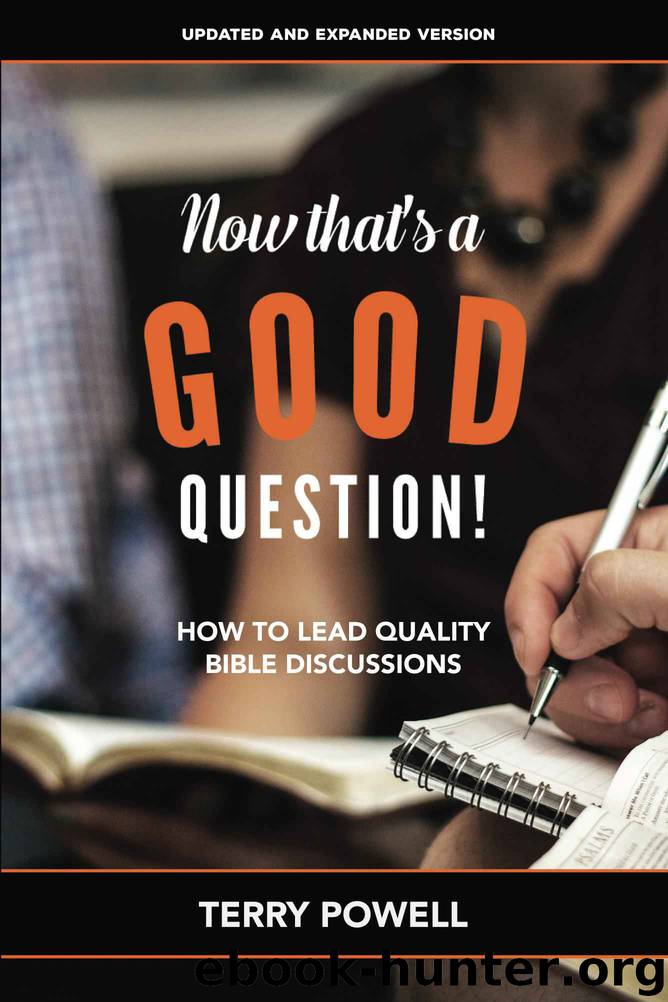Now That's a Good Question!: How To Lead Quality Bible Discussions by Terry Powell

Author:Terry Powell [Powell, Terry]
Language: eng
Format: azw3
Publisher: ServeStrong Publishing
Published: 2016-03-01T05:00:00+00:00
You Risk Inaccuracies When Your Queries...
Foster speculation about the text
Shift the focus of authority from God’s Word to participants’ opinions
Encourage exploration of irrelevant material
Irrelevant Questions
This type of question “majors on minors.” It dissects a word, phrase, or name in a verse without consideration of its larger context. Or it focuses on details that are relatively insignificant in view of the passage’s main theme.
Aiming for accuracy in a discussion isn’t only a matter of avoiding speculation and outright error. It’s also sticking to the overarching theme of a text and covering just those facts and truths that develop your subject slant. When less significant passage data steals the spotlight, discussion becomes a game of “trivial pursuit.”
Now let’s turn to the theme of Matthew 4:1-11. By examining Jesus’ bout with Satan, we gain insights to help us experience victory in spiritual warfare. Matthew weaves two threads of thought through the fabric of these verses. He illustrates battle strategies and characteristics of Satan, our archenemy. Through the example of Jesus, he shows us the value of Scripture as a defense against temptation. All study questions tossed out to the group should reinforce the primary theme and lead to discovery, analysis, and application of the two specific subject slants.
Questions that Usurp Biblical Authority
Another way to encourage an inaccurate interpretation of a Bible passage is to transfer the authority from God’s Word to the group members. You’d never do this intentionally, but it often happens when a group leader is inexperienced or poorly prepared. A question such as, “What does the verse mean to you?” encourages too much subjectivity and shifts the focus away from the text. It encourages people to “create meaning” rather than analyze the material.
Is It Sensitive?
When is a question sensitive? When you make personal responses voluntary and when you’re realistic about participants’ ability to answer.
Download
This site does not store any files on its server. We only index and link to content provided by other sites. Please contact the content providers to delete copyright contents if any and email us, we'll remove relevant links or contents immediately.
Victory over the Darkness by Neil T. Anderson(2859)
The Rape Of Nanking by Iris Chang(2812)
Chosen by God by R. C. Sproul(2160)
Habits of Grace by David Mathis(1976)
Crash the Chatterbox by Steven Furtick(1973)
Knowing God by J.I. Packer(1852)
How To Be Born Again by Billy Graham(1775)
A Prophet with Honor by William C. Martin(1717)
Gospel-Shaped Marriage by Chad van Dixhoorn(1716)
Peace with God by Billy Graham(1681)
Confronting Christianity by Rebecca McLaughlin(1587)
God's Smuggler by Brother Andrew(1542)
Angel Dreams by Virtue Doreen Virtue Melissa(1474)
Whisper by Mark Batterson(1452)
The School of Biblical Evangelism by Ray Comfort(1433)
Missionaries by Norman Lewis(1427)
The Truth War by John MacArthur(1422)
The Poems of Rowan Williams by Rowan Williams(1354)
Do Greater Things by Robby Dawkins(1324)
